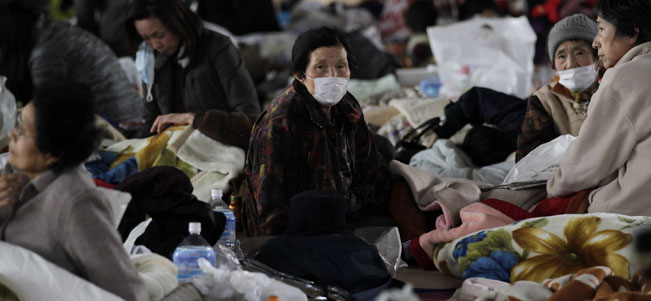Japanese agency: Explosion heard at nuclear plant


SOMA, Japan – A third explosion in four days rocked the earthquake-damaged Fukushima Dai-ichi nuclear plant in northeast Japan early Tuesday, the country's nuclear safety agency said.
The blast at Dai-ichi Unit 2 followed two hydrogen explosions at the plant — the latest on Monday — as authorities struggle to prevent the catastrophic release of radiation in the area devastated by a tsunami.
The troubles at the Dai-ichi complex began when Friday's massive quake and tsunami in Japan's northeast knocked out power, crippling cooling systems needed to keep nuclear fuel from melting down.
The latest explosion was heard at 6:10 a.m. Tuesday (2110 GMT Monday), a spokesman for the Nuclear Safety Agency said at a news conference. The plant's owner, Tokyo Electric Power Co., said the explosion occurred near the suppression pool in the reactor's containment vessel. The pool was later found to have a defect.
International scientists have said there are serious dangers but not at the level of the 1986 blast in Chernobyl. Japanese authorities were injecting seawater as a coolant of last resort, and advising nearby residents to stay inside to avoid contamination.
Tokyo Electric Power said some employees of the power plant were temporarily evacuated following Tuesday morning's blast.
The accidents — injuring 15 workers and military personnel and exposing up to 190 people to elevated radiation — have compounded the immense challenges faced by the Tokyo government as it struggles to help hundreds of thousands of people affected by twin disasters that flattened entire communities and may have left more than 10,000 dead.
The crisis also has raised global concerns about the safety of such reactors at a time when they have enjoyed a resurgence as an alternative to fossil fuels.
Japanese authorities said there have been no large-scale radiation releases, but have detected temporary elevations in levels, and have evacuated tens of thousands of people from around affected reactors. Prevailing winds were pointing out to sea, and U.S. ships assisting tsunami recovery moved further way to avoid potential danger.
http://news.yahoo.com/s/ap/20110314/ap_on_bi_ge/as_japan_earthquake_nuclear_crisis



Tidak ada komentar:
Posting Komentar